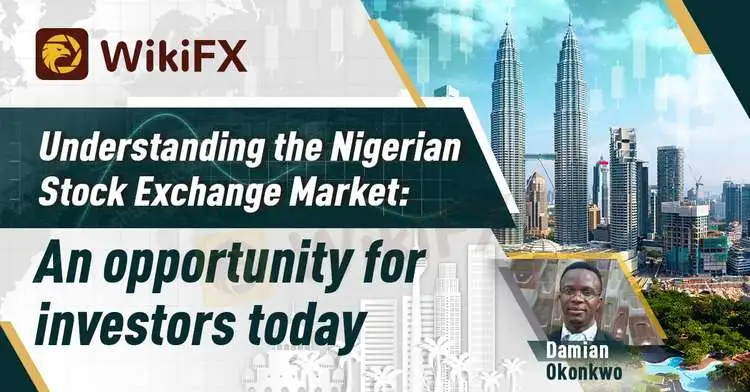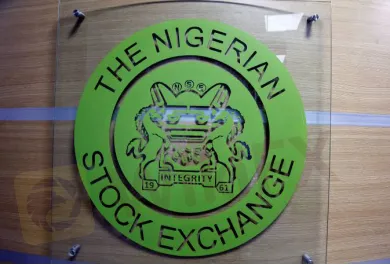简体中文
繁體中文
English
Pусский
日本語
ภาษาไทย
Tiếng Việt
Bahasa Indonesia
Español
हिन्दी
Filippiiniläinen
Français
Deutsch
Português
Türkçe
한국어
العربية
Understanding the Nigerian Stock Exchange Market: An opportunity for investors today
Abstract:The Nigerian Stock Exchange (NSE) was founded just a year after her independence in the year 1961. The first stock exchange market was established in Lagos. From here it spread to other parts of the country. As of today, over 4,900 companies have been listed on the NSE. On the Fixed Income market, the NSE has over 96 FGN bonds, 31 state bonds, 34 corporate bonds, 2 supranational bonds, and 53 memorandum listings.

By: Damian Okonkwo
Meaning of Stock Exchange Market
The stock exchange market is a centralized market where securities, such as company's stocks are bought as investments by individuals including the government in the hope of receiving higher returns as the company's network and stock value appreciates. When an individual purchases a company's stock, he becomes a legal shareholder in the company and is eligible to claim part of the company's residual assets and earnings based on the point he purchased. Stocks and shares are synonyms used interchangeably.
The stock exchange does not own shares any shares rather it acts as a market platform where stock buyers easily connect with stock sellers making buying and selling of stocks easy and reliable.
With the advancements in technology today, buyers and sellers no longer need to visit the open market to buy stocks but can simply do so from the comfort of their homes. This is made possible through stockbrokers.

How does the Nigerian Stock Exchange Market operate?
The Nigerian Stock Exchange Market runs an Automated Trading System (ATS) which was established by the Nigerian government on April 27, 1999. The ATS connects buyers with sellers and dealers through a computer network also known as Electronic Communication Network (ECN).
What are the trading hours for the Nigerian Stock Exchange Market?
The Nigerian Stock Exchange Market is every day from Monday to Friday at 9.30 a.m and closes at 2.30 p.m. Traders are free to carry out their transactions during these hours.
How can one Find the prices of different companies' stocks to purchase?
The Market prices of the stocks for all the companies listed on the NSE alongside an All-Share Index, NSE 30, and Sector Indices, are published daily in The Stock Exchange Daily Official List and also on the Nigerian Stock Exchange CAPNET (an intranet facility). Recommendations on the best stocks to buy can be found on the Wikifx.com website.
Who regulates the Nigerian Exchange Market?
The Nigerian Exchange Market is regulated by the Security and Exchange Commission (SEC) and supervised by the Federal Ministry of Finance.
Nevertheless, it is important to note that the stocks sold at the Nigerian Stock Exchange (NSE) are privately owned and regulated by the owners. The SEC only supervise the NSE to ensure that various companies fulfill their mandate to the shareholders. They protect the investors from fraud and bridge of trust.

Disclaimer:
The views in this article only represent the author's personal views, and do not constitute investment advice on this platform. This platform does not guarantee the accuracy, completeness and timeliness of the information in the article, and will not be liable for any loss caused by the use of or reliance on the information in the article.
Related broker
Read more

What Are The Common Types of Unregulated Forex Brokers?
Protect your investments from unregulated forex brokers with these tips. Learn about red flags, scams, and how the WikiFX app ensures safe trading experiences worldwide.

Pros and Cons of Choosing Unregulated Forex Brokers
Discover the pros and cons of unregulated forex brokers, explore risks, benefits, and key features, and learn how to evaluate their credibility with the WikiFX app.

5 Questions to Ask Yourself Before Taking a Trade
Before executing any trade, traders should pause and ask themselves critical questions to ensure they are making rational and well-informed decisions. Here are five questions to help you reflect on your strategy, manage risk, and control emotions before entering the market.

The Psychology of Investment Scams: Understanding Why Victims Fall Prey
Investment scams have become increasingly sophisticated, preying on human psychology to exploit vulnerabilities. While these fraudulent schemes promise extraordinary returns, they often rely on psychological tactics to deceive victims. Understanding these factors can help traders recognise and avoid falling for scams.
WikiFX Broker
Latest News
Volkswagen agrees deal to avoid Germany plant closures
Geopolitical Events: What They Are & Their Impact?
Top 10 Trading Indicators Every Forex Trader Should Know
TradingView Launches Liquidity Analysis Tool DEX Screener
MultiBank Group Wins Big at Traders Fair Hong Kong 2024
WikiEXPO Global Expert Interview: Simone Martin—— Exploring Financial Regulation Change
'Young investors make investment decisions impulsively to keep up with current trends' FCA Reveals
Why Do You Feel Scared During Trade Execution?
CySEC Settles Compliance Case with Fxview Operator Charlgate Ltd
Malaysian Influencer Detained in Taiwan Over Alleged Role in Fraud Scheme
Currency Calculator


